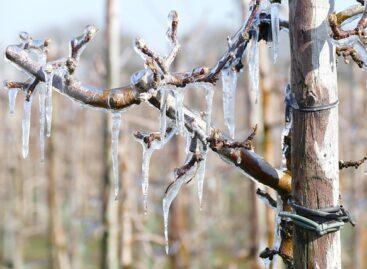If the environment changes, farmers must also change
If the environment changes, we can be sure of one thing: the farmers must also change – stressed István Nagy, Minister of Agriculture, to former head of state János Áder in his latest podcast, Kék Bolygó, published on Monday and available on the most popular video-sharing portal.

When asked by János Áder, chairman of the board of trustees of the Kék Bolygó Climate Protection Foundation, that today everyone is talking about the flood, but the summer of 2024 was about the drought, the heat alerts, the new and new heat records, and whether it is possible to know how much damage this year’s drought caused, István Nagy stated that this year’s drought was not comparable to the 2022 drought on a historic scale. At that time, the extreme drought affected 1.2 million hectares, this year farmers reported drought damage on 390,000 hectares, including 160,000 hectares in the Southern Great Plain, he said. A solution to this problem must be found, but there is no single good solution, many complex solutions must be applied at the same time, he added. According to him, many steps have been taken to mitigate the damage since 2022 and since the beginning of their administration, the most important of which is a change in attitude. During the flood season, dams are clearly needed, but at the same time, water must be conserved and managed, as a result of the creation of the legal background, the legislation on irrigation management states that irrigation is a public interest, he pointed out. He explained that it was possible to excavate the possible locations of 447 flat and hilly reservoirs, and the possibility of expropriating eight temporary water reservoirs and declaring them permanent reservoirs, in which five million cubic meters of water can be stored, was created. At the same time, the Minister of Agriculture noted that the European Union did not support Hungary’s request for the implementation of an irrigation development program, citing the protection of the drinking water base, and therefore it will be implemented from national funds under the title of building an ecological water replacement system in the Operational Program for the Environment and Energy.
János Áder drew attention to the fact that the conditions for irrigation can be created not only at the expense of the drinking water base, but also by retaining water, draining surface water, using groundwater and water stored in canals. According to the former President of the Republic, 7-10 percent of the cultivated areas in Hungary can be made irrigated for geographical, hydrographic and budgetary reasons, and the irrigation of all areas is an illusion.
István Nagy indicated that 40 percent of Europe was affected by the drought this year, which is to such an extent that it causes problems even in more developed countries with a higher technological level. The problem can be alleviated, but it cannot be completely solved, it can only be moderated, and efforts must be made to ensure that this is always done in accordance with local characteristics, the Minister of Agriculture stated. He explained that there are some places where it is best to manage the water level, while in other places it is most appropriate to clean and expand the canal, repair the sluice or flood it, or maybe build the most modern drip irrigation. It must also be decided whether it is worthwhile to sow corn in a sandy, dry place, if so, which hybrid, or whether it would be safer to replace it with sorghum, a grain sown in autumn – he pointed out. He added that it is also possible to change technology and soil cultivation. According to István Nagy, the attitude of farmers must change. “If I accept that I have to change because everything around me is changing, then we are already on the road to success,” he said. János Áder emphasized that the key word is adaptation, because the years of drought will repeat themselves, and the associated problem will not have to be faced every 10-15 years, but every two, four years, or more often. The Minister of Agriculture believed that the farmers are open, they know that changes need to be made, which is also proven by the fact that 82 percent of the arable fields received support from the agro-ecology fund. This provides additional resources for no-till, as well as water-conserving and water-retaining technology, which will increase crop security and provide a more secure livelihood.
In the conversation, János Áder called it wishful thinking that it would be possible to keep the average temperature rise in the Carpathian Basin below two degrees Celsius
He asked the Minister of Agriculture what he could do to help the fruit and vegetable sector. István Nagy called the situation critical. He explained that there are two extremes: the outdated plantation with old technology and no protection, and the most modern, intensive plantation with irrigation and protection against ice and frost, the creation of the latter is supported because it gives the security of production. If the owners of the aging plantations and the descendants of the elderly farmers cannot be persuaded to undertake the investments, apply and commit themselves to fruit cultivation, then they will come out as losers in the fight against climate change, he emphasized. János Áder also asked István Nagy, who worked as a member of the parliament and previously as the mayor of Mosonmagyaróvár, and who recently got involved in defense in the area, about the flood. The head of the ministry highlighted the accuracy of the forecasts regarding the peak of the flood wave and its time, the organization and discipline, as well as the flood protection investments implemented since 2013, thanks to which the people living along the Lajta are safer than before. János Áder noted that 4,200 kilometers of dams need to be maintained in Hungary, 500 kilometers currently have flood protection, and serious developments have taken place not only along the Danube, but also along the Tisza. István Nagy also spoke about European agricultural regulation. He stressed the need to find a balance between sustainability and competitiveness, otherwise both food security and food supply are at risk.
MTI
Related news
Rapeseed prices fell worldwide and domestically
🎧 Hallgasd a cikket: Lejátszás Szünet Folytatás Leállítás Nyelv: Auto…
Read more >Related news
Hétéves növekedési stratégiát jelentett be az Auchan
🎧 Hallgasd a cikket: Lejátszás Szünet Folytatás Leállítás Nyelv: Auto…
Read more >








